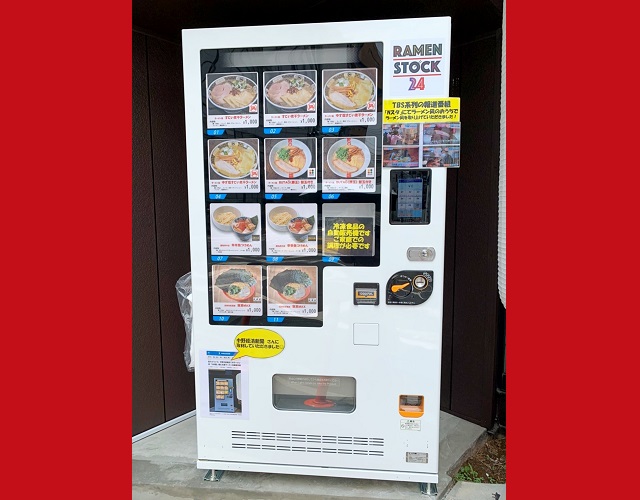
Ramen Stock 24 baffles our minds and delights our souls.
Normally, getting late-night restaurant-quality ramen isn’t hard to do in Tokyo, as restaurants serving Japan’s favorite noodle dish often stay open into the wee hours of the morning. Life during the pandemic is anything but normal, though, and during the current government-declared state of emergency, many restaurants are closing at 8 p.m.
That puts ramen fans who work irregular schedules, like us, in a bind. Sometimes by the time we clock out, our favorite ramen restaurants have stopped serving food for the night and we have to settle for the lesser joy of picking up some cup ramen from the convenience store. But we recently heard about a new option that lets us get our hands on restaurant-quality ramen 24 hours a day!
Getting off the train at Tokyo’s Nakano Station a little after 10 p.m., we went out the south exit and after a few minutes walking arrived at Ramen Stock 24.
Ramen Stock 24 isn’t a restaurant or a store, though, but a vending machine filled with frozen ramen!
It’s not just some generic ramen, either. Taking a look at the selection, we found offerings from some of Tokyo’s most famous and popular ramen restaurants, such as Ramen Nagi, Kichijoji Musashiya, and Mendokoro Inosho. And even if you don’t recognize any of those names, the machine is plastered with mouthwatering photos of each variety to help you choose.
While Nagi’s salty yuzu cirtrus and Inosho’s extra-spicy tsukmen were both tempting, in the end we decided to go with Musashiya’s Iekei Max. We’ve got fond memories of eating the noodles in a garlic tonkotsu pork stock broth at Musashiya’s restaurant in Tokyo’s Kichijoji neighborhood, and wanted to see how close the frozen version was to the original’s taste.
▼ Iekei Max
Ramen Stock 24 charges a flat fee of 1,000 yen (US$9.10) for all of its ramen, so we inserted a bill in the slot and punched in the number for the Iekei Max.
The machine’s mechanicals whirred to life, and our ramen dropped down into the slot for us to retrieve.
There’re even bags on a hook attached to the side of the machine, so that you don’t have to give yourself frost burn by carrying the frozen ramen pack home in your hands. However, there isn’t any dry ice or other portable cooling agent provided, so you’ll want to bring your own or, like we did, head for home soon after buying your frozen ramen.
Back home, we opened the package and spread out the contents, which consisted of a pack of noodles, a pouch with the broth and chashu pork, another with spinach, one more with seaweed, and an instructions sheet.
Step 1 is to bring a pot of water to a boil, then toss in the unopened broth/chashu pack to cook for 15 minutes. The unopened spinach also needs to boil for three to five minutes, so you can add it to the pot at the tail end of the broth’s cooking time.
Next you’ll need to open the noodle packet and boil the noodles for three to three and a half minutes. Give them a few stirs with your cooking chopsticks, pasta spoon, or whatever other cooking utensil you’re using to help them separate.
▼ The directions recommend using a second pot/pan to cook the noodles, so that you can time them to finish right around when the broth is ready.
Once the broth, noodles, and spinach are cooked, add them all to your bowl, in that order.
Last, open up the nori (dried seaweed) pack. Arrange the strips artfully around the rim of the bowl (and there are a lot of them), and you’re ready to eat!
Actually, it’s not just the nori that you get a generous portion of, but the noodles and broth too, so much so that we actually couldn’t fit everything in the bowl we were using and had to leave some in the pots as we began our taste test. Following orthodox ramen tasting etiquette, we began with a spoonful of broth, and the flavor was baffling.
We don’t mean that it tasted weird, though. No, what was baffling was how amazingly accurate it was to the broth you get when eating at the actual Kichijoji Musashiya restaurant. It was an absolutely exact match, and honestly, if we’d hadn’t seen the frozen ingredients being boiled and someone just gave us the finished product to taste, we’d assume it was a direct delivery from the restaurant’s cooks to our doorstep.
That goes for the rest of the ingredients too. Ramen Stock 24 had promised us a replication of the flavor we know and love from eat-in ramen, and they were as good as their word, with no dip in quality that our taste buds could perceive.
In addition to the one in Nakano that we visited, there are currently Ramen Stock 24 vending machines in Tokyo’s Takadanobaba and Itabashi neighborhoods too. Granted, they’re still not anywhere near as common as Japan’s ubiquitous soft drink vending machines, but it’s good to know we’ve got multiple machines waiting to satisfy the ramen-shaped hole in our hearts/stomachs whenever we need them to.
Location information
Ramen Stock 24 / ラーメンストックニジュウヨン
Address: 東京都中野2-28-8
Tokyo-to-, Nakano 2-28-2
Photos ©SoraNews24
● Want to hear about SoraNews24’s latest articles as soon as they’re published? Follow us on Facebook and Twitter!
[ Read in Japanese ]